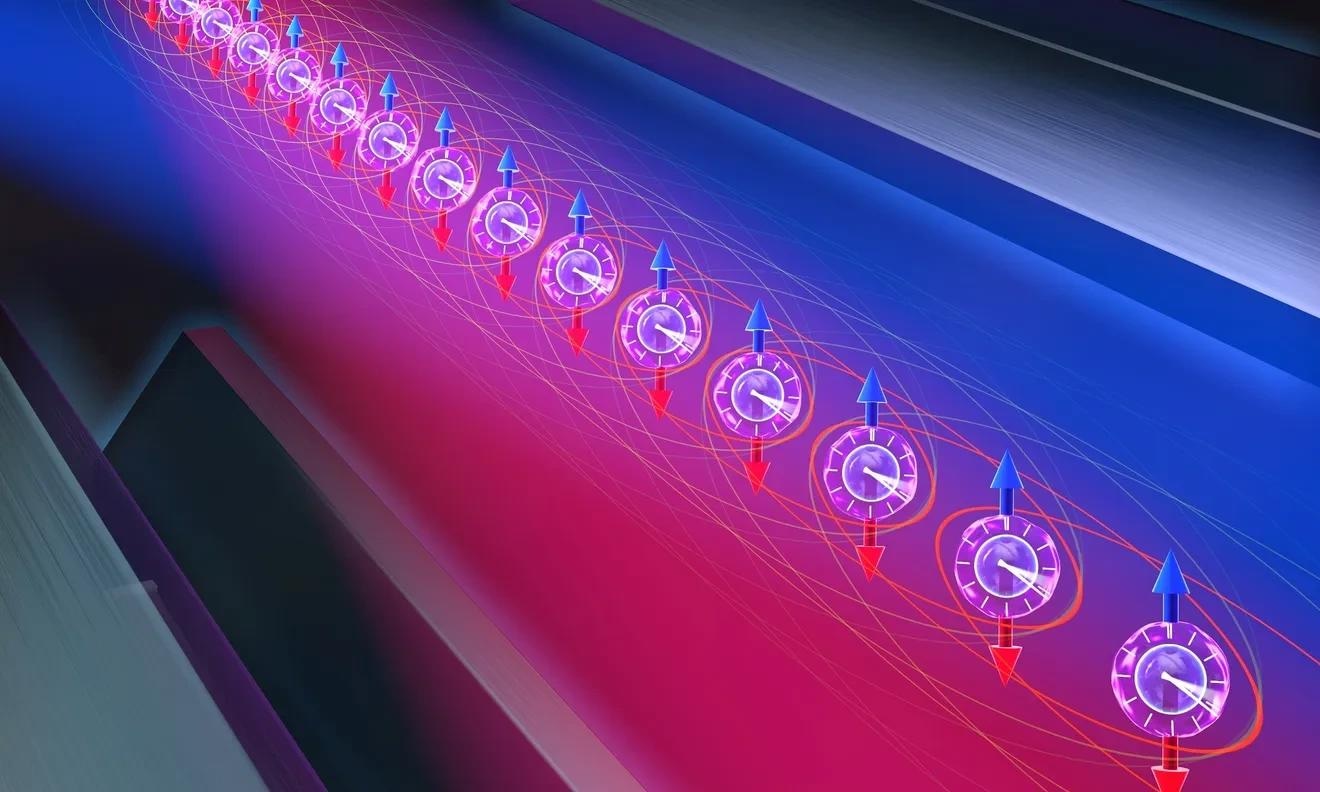Sensors that are significantly more accurate than conventional devices have been made possible by quantum physics. Now, multiple studies published in Nature indicate that the entanglement generated by finite-range interactions could be used to significantly improve the precision of these quantum sensors. This improvement was demonstrated by Innsbruck researchers under the direction of Christian Roos utilizing entangled ion chains with up to 51 particles.
 Innsbruck physicists entangled all particles in the chain with each other and produced a so-called squeezed quantum state. Image Credit: University of Innsbruck
Innsbruck physicists entangled all particles in the chain with each other and produced a so-called squeezed quantum state. Image Credit: University of Innsbruck
Atomic clocks based on atomic oscillations are used by metrological organizations across the world to regulate the flow of time. These clocks, which are essential for operations like satellite navigation and data transfer, have lately been enhanced by employing optical atomic clocks with ever-higher oscillation frequencies.
Researchers from the University of Innsbruck and the Institute of Quantum Optics and Quantum Information (IQOQI) of the Austrian Academy of Sciences, under the direction of Christian Roos, have now demonstrated how a specific method of producing entanglement can be used to further enhance the accuracy of measurements essential to the operation of an optical atomic clock.
Measurement Error Halved in Experiment
Quantum system observations are always susceptible to some degree of statistical uncertainty.
This is due to the nature of the quantum world. Entanglement can help us reduce these errors.
Johannes Franke, Ph.D. Student, University of Innsbruck
The Innsbruck scientists verified the measurement precision on an entangled ensemble of particles in the lab with the assistance of theorist Ana Maria Rey from JILA in Boulder, USA. The ions were arranged in a vacuum chamber, and the scientists employed lasers to control and entangle their interactions.
The interaction between neighboring particles decreases with the distance between the particles. Therefore, we used spin-exchange interactions to allow the system to behave more collectively.
Raphael Kaubrügger, Ph.D. Student, University of Innsbruck
As a result, the chain’s particles became entangled with one another and created a condition known as a squeezed quantum state. This allowed the scientists to demonstrate that entangling 51 ions in relation to distinct particles can reduce measurement errors by about 50%. In the past, entanglement-enhanced sensing was mostly dependent on infinite interactions, which restricted its applicability to certain quantum platforms.
Even More Accurate Clocks
The Innsbruck quantum physicists were able to demonstrate through their experiments how quantum entanglement increases the sensitivity of sensors.
We used an optical transition in our experiments that is also employed in atomic clocks.
Christian Roos, Senior Scientist, Institute of Quantum Optics and Quantum Information
Areas where atomic clocks are now employed, including satellite-based navigation or data transfer, could benefit from this technology. Additionally, these cutting-edge clocks could open new opportunities in investigations like the hunt for dark matter or the analysis of the temporal fluctuations of fundamental constants.
The innovative technique will now be tested in two-dimensional ion ensembles by Christian Roos and his team. The journal Nature reported the most recent findings. Researchers used neutral atoms to report surprisingly similar findings in the same issue. The Austrian Science Fund FWF and the Federation of Austrian Industries Tyrol, among others, provided financial assistance for the Innsbruck research.
Journal Reference:
Franke, J., et al. (2023) Quantum-enhanced sensing on optical transitions through finite-range interactions. Nature. doi:10.1038/s41586-023-06472-z.